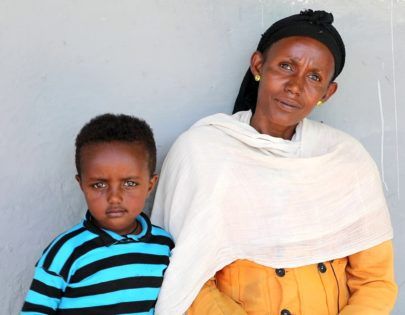 Stories
Stories
December 3, 2021 • 2 min read
13 years ago, residents of Kinchera Leto in southwestern Oromia region were delighted to welcome the opening of a new health centre in their community. 5,000 people from there and neighbouring communities finally had effective access to healthcare facilities.
Their delight was short-lived, however, when the river Awash flooded the community later that year. Flooding was heavier than usual, and there was widespread destruction, including to the new health post and its equipment.
“We were saddened by the destruction,” says Dinkecha Geda, Chairperson of the village council. “The community was in desperate need of accessible health care service and then when we finally had the service we dreamed of the river came and took everything with it.”
During subsequent rainy seasons, the road leading in and out of the small town remained inaccessible to vehicles. People had to walk to access different services from other nearby towns. If someone became sick or needed medical assistance, there were limited ways to bring them out.
“Unless someone was seriously sick or injured,” says community member Jorge Urga, “we didn’t want to go to other towns’ health care centres, due to the distance. Most of all, pregnant mothers and children were suffering due to different diseases. They would stay at home until there was an emergency need to see a doctor, transporting them with a stretcher.”

Jorge Urga with her son, Negashu.
Restoring Access to Healthcare
Seeing the need to improve access to healthcare in the region GOAL, with support from the World Health Organisation (WHO), conducted a needs assessment in the area. Eight health facilities were identified as needing varying levels of assistance. The Kinchera Leto health post was seen as a priority for GOAL’s support.
“To improve access to healthcare as soon as possible, we had to start the intervention at the beginning of the rainy season, limiting access to the community. Due to the remote location, we regularly walked for two hours, bringing the materials to repair the health post with us. With great levels of support from the local community, we were able to rehabilitate and improve the facility and relaunch the local health service again,” says Tilahun Lulseged, Assistant Programme Manager, GOAL Ethiopia.
Learning from experience, the health post was reconstructed in a way that limits the impact if and when flooding happens again.
“Such interventions embody the meaning of sustainable development, so I am grateful to WHO’s financial support, the district administration’s dedication, the local community’s commitment, and all the GOALies who took part in the project.” Tilahun concluded.
